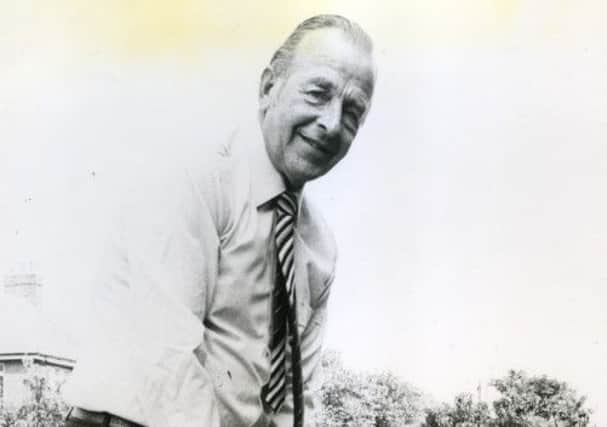Watson’s Test stand etched on the minds of schoolboys who followed his trailblazing path


The answer is that as well as having represented their county and country respectively, they are all graduates of the Yorkshire Schools’ Cricket Association system.
They are not alone. In total, 33 players have taken the path from county schools to White Rose honours to international caps in the 90 years of the Yorkshire Schools’ Cricket Association.
Advertisement
Hide AdAdvertisement
Hide AdAs well as Root, Vaughan and Boycott, some of the other famous alumni who played for Yorkshire Schools’ Under-15s are Jack Birkenshaw, Geoff Cope, Martyn Moxon, Richard Blakey, Darren Gough, Anthony McGrath, and the father and son combinations of David and Jonny Bairstow, and Arnie and Ryan Sidebottom.
In the year Boycott played for the schools’ association, 1955, he did so alongside fellow future England players John Hampshire, Jack Birkenshaw and Chris Balderstone.
Thirty-five years later, when Vaughan first donned the whites of the schools’ Under-15s, Alex Wharf, Gary Keedy, Ian Sutcliffe and Andrew Bairstow were also in the team.
Each of those young schoolboys followed in the trailblazing steps of Willie Watson, one of the great names of sport in post-war Britain. Watson, an exceptional cricketer, was equally adept at football.
Advertisement
Hide AdAdvertisement
Hide AdBorn in Bolton-on-Dearne, Barnsley, on March 7, 1920, Watson played 23 Test matches for England over an eight-year spell in the 1950s.
Prior to that, he played four times for the England football team from 1949 to 1950, and was a member of the 1950 World Cup squad. As a talented midfielder he played for Huddersfield Town and Halifax, but it was with Sunderland where he made his name.
Cricketing-wise, his journey to the England team began under the umbrella of the Yorkshire Schools’ Cricket Association, which was founded in 1923.
Eleven years later, he made his debut in the county’s Under-15s team, and by 1939 he was making his bow in the Yorkshire team.
Advertisement
Hide AdAdvertisement
Hide AdThe outbreak of war stopped the career of the left-handed batsman before it had even got off the ground.
But after World War II, he played for 12 years with Yorkshire before leaving the county of his birth in 1958.
He enjoyed an Indian summer with Leicestershire, whom he served as captain and assistant secretary for the best part of six years.
He scored 25,670 first-class runs at an average of 39.86, making 55 centuries.
Advertisement
Hide AdAdvertisement
Hide AdWatson – renowned for his outstanding ability on difficult pitches – earned his place in the England team in 1951, in a Test match against South Africa, becoming the first Yorkshire Schools’ graduate to make the international grade.
His finest hour would also precipitate the beginning of the end of his England career. In the 1953 Ashes he scored 109 in a stand of 163 with Trevor Bailey which helped England save the second Test at Lord’s. Despite his stoic efforts, Watson was dropped. In all he scored 879 runs in an on-off Test career which ended in March 1959 against New Zealand.
Through much of the early part of the 1950s Watson played cricket in the summer and football in the winter.
When he retired from playing football in 1956, he did so having already been player-manager of Halifax Town, whom he would return to lead in 1964. He also managed Bradford City.
Advertisement
Hide AdAdvertisement
Hide AdWatson’s coaching career in cricket flourished in South Africa, where he emigrated in 1968, to coach the Wanderers.
Watson died on April 24, 2004, in Johannesburg. In the Yorkshire Post two days later, the tributes were plentiful.
“Apart from Len Hutton and Walter Hammond, he was the best player on a bad wicket you could hope to see,” said Dickie Bird, the Yorkshire umpire.
“Willie was a man of immense talent which Yorkshire shared with his love of football,” added Cope, the-then director of operations at Yorkshire who walked the same path as Watson, from schools association, to county, to country.
Advertisement
Hide AdAdvertisement
Hide AdLater in the week, Bird wrote in Watson’s obituary in the Yorkshire Post: “Willie’s stand of 163 in that game with Trevor Bailey was cricket’s equivalent of Dunkirk, a performance etched on the minds of a generation of schoolboys. As for his glittering achievements, he never talked about them; he was not a man to blow his own trumpet.”
To celebrate their 90th anniversary, the Yorkshire Schools’ Cricket Association is having a dinner at Scarborough on Monday, August 12, after the current Under-15s schools team have played their Lancashire counterparts.